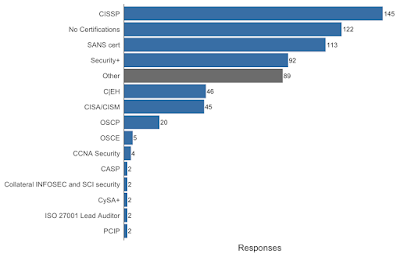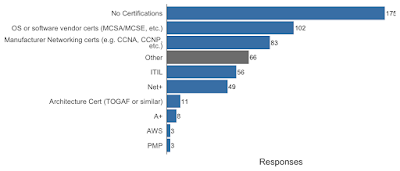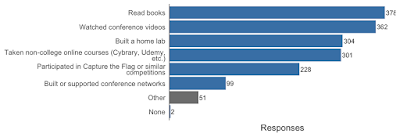What's new arround internet
| Src | Date (GMT) | Titre | Description | Tags | Stories | Notes |
| 2020-03-20 14:21:17 | Certifications and self-study (lien direct) | Let's take a quick look at some non-degree data, certifications and self study:What security certifications have you earned (current and/or lapsed)? Please add certs not listed under “Other”. Which non-security certifications have you earned (current or lapsed)? Please add certs not listed under “Other”. Which non-security certifications have you earned (current or lapsed)? Please add certs not listed under “Other”. Have you done any of the following self-study or non-traditional training? Please use the “Other” option to add other methods. Have you done any of the following self-study or non-traditional training? Please use the “Other” option to add other methods. These answer say a lot about many people drawn to the security realm, we study and learn in a wide variety of ways. As the past NOC lead for a hacker con, I am really pleased to see so many folks helping run networks at events, it is a great way to help the community, and to learn in the process. The survey is still open, and the answers keep coming in. Next week we will take a look at demographics. These answer say a lot about many people drawn to the security realm, we study and learn in a wide variety of ways. As the past NOC lead for a hacker con, I am really pleased to see so many folks helping run networks at events, it is a great way to help the community, and to learn in the process. The survey is still open, and the answers keep coming in. Next week we will take a look at demographics. |
Guideline | |||
| 2017-02-01 06:11:06 | A few words about ovarian cancer (lien direct) | Cancer sucks. The number of people who are touched by cancer is terrifying, it is rare to find someone who hasn't had friends or family attacked by cancer if they've avoided it themselves. Sometimes, as with my bladder cancer, it's not that bad- for me I get a rather uncomfortable exam regularly, and sometimes get a small tumor or two removed, no big deal. That makes me lucky, few who face cancer get to shrug it off as a mere annoyance. Since I've recently learned a lot more about ovarian cancer than I ever expected to know, I'd like to share a few things with everyone. Remember, I'm not a medical professional, these are my observations and ideas formed over the two and a half years of my late wife's struggle with clear cell ovarian cancer. First, routine tests and doctor visits are unlikely to detect it early. Second, it's insidious- many women develop ovarian cancer around the time of menopause, and many of the symptoms of the cancer are also expected conditions that accompany menopause. There is a blood test which looks for a marker, CA 125, which may help detect ovarian cancer but the test is far from perfect. Many people have suggested it should be a regular test, others think it may lead to a false sense of security. Gilda Radner talked about the test in her autobiography before we lost her to ovarian cancer. Here's my take- and keep in mind that I'm not a doctor of anything and this isn't medical advice- I think that CA 125 screening and the symptoms of ovarian cancer are things women should be aware of. I think that routine CA 125 screening probably makes sense for women with a family history of cancer, maybe for a broader population- but only if the test is considered a weak indicator, and is done as part of comprehensive medical care (a low reading does not mean there's no cancer). If you have a healthy relationship with your doctor it should be part of a conversation, as with most tests. I don't think much about my prostate, but I do think about symptoms of prostate problems every time my doctor sends me off for a PSA test. Awareness of symptoms, thinking about them honestly, and having real conversations with your doctors is key to minimizing Bad Things. Note: I was going to prefix this with a note saying this is another personal post with nothing to do with InfoSec, then I realized I'm talking about using weak indicators as component in a comprehensive detection plan, and that sounds pretty familiar. I don't want to watch any more people die of cancer, and neither do you. But we will, so let's try to spread the word and minimize the suffering. Finally, I am not a doctor, psychologist, or anyone else who can provide real help- but if you or a loved one are facing ovarian cancer and want someone to talk to, yell at, or commiserate with- reach out to me. There's email info in the upper right corner of the page. Jack | Guideline | |||
| 2016-10-07 13:46:06 | Wrong About Conferences, part 3 (lien direct) | Thought I'd get tired of this topic? No way, I'm just getting warmed up. Today's installment continues on the events themselves: A lot of people complain about the commercialization, the sales pitches, the circus-like atmosphere of some vendor areas. I'm not a big fan of these things myself (OK, I loathe them), I prefer to engage with vendors in a rational manner- but whether you are buying antivirus, SIEM, a new car, or a washing machine, expect the sales hype. If you are like me you'll ignore the excesses and gravitate towards the companies who bring engineers and maybe even support personnel to accompany the sales and marketing teams to shows so that they can answer hard questions and help existing customers. And if you aren't buying, or curious about the tech, avoid those parts of the events altogether (or as much as the venue allows). The same events which have the big vendorfests are often the best for meeting people for quiet meaningful conversations- not at the show but nearby, away from the mayhem. If thousands of people go to the event, there may be folks there you want to talk to, you don't have to meet at the conference. If you are going to do this, make appointments. You will not just run into folks and have time to chat. And “I'll meet you in the lobby†isn't good enough, especially at sprawling complexes like the Moscone Center in San Francisco, the Las Vegas Convention Center, and other huge venues. The flip side of over commercialization are the community events with little or no advertising and sales. They are a great relief to many of us who suffer the excesses at commercial shows, but they don't generate leads for the sponsors so it can be hard to pull in the funding needed for the event. These events often get funded primarily through ticket sales because someone has to pay. A lot of companies will provide sponsorship for visibility and the good of the community, but there are a lot of community conferences and not enough money for all of them. The realms of for-profit, not-for-profit, and non-profit are too convoluted a topic for this series, bet whether people want to make money from an event or not, they want people to like the event. It is also worth mentioning the size of events. Everyone want to go to the cool events, and so some grow until they aren't what they used to be, and a lot of folks complain about this. When I hear such complaints I am reminded of what the sage Yogi Berra said many years ago about Rigazzi's in St. Louis: “Nobody goes there anymore, it's too crowded†But if events cap attendance and demand continues to grow they get accused of being exclusionary by some. What's a conference organizer to do? You'll note I've avoided naming specific events, although I'm sure most of you have assigned names to several things I've mentioned. I would, however, like to use one specific group as an example, an example that could be applied to many other groups and events. DC303, the Denver area DEF CON group, is well known and very active, and I've heard them accused of being “cliquish†and excluding people from activities and events. I would like to make two points abut DC303 (note, I am *not* a 303 member): First, as with most organizations, some things are limited to members. I can't expect to toss my kayak in the bay and be welcomed down at the yacht club. Some things are more open than others- and some do require an invitation, which leads to my second point: My first interaction with the 303 crew was in July of 2009, at the first BSides Las Vegas. I knew almost no one other than from a few online exchanges, they certianly didn't know me. And it didn't matter, I showed up and got to work as did several others- and many of us became friends. That's it, th | Guideline |
1
We have: 3 articles.
We have: 3 articles.
To see everything:
Our RSS (filtrered)
